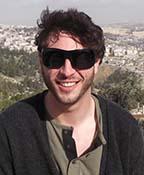Museum Catering Captain Inspired by Birthright
The following article was written by Joan Elovitz Kazan and originally posted by the Wisconsin Jewish Chronicle. Reprinted with the permission of the Milwaukee Jewish Federation. Alex Weiss is an alumn of Israel Outdoors group TL-25-461 in February of 2012.
 If you decide to celebrate a simcha, like a wedding or bar/bat mitzvah, at the Milwaukee Art Museum, you will encounter Alex Weiss.
If you decide to celebrate a simcha, like a wedding or bar/bat mitzvah, at the Milwaukee Art Museum, you will encounter Alex Weiss.
He is the catering captain and event manager, with anywhere from five to 40 people reporting to him, depending on the occasion. As he explained to The Chronicle, it is his job to “make sure the room is perfect” for events. And he has worked with many Jewish celebrations, including a “kosher wedding” in which the celebrants brought in their own plates. “It runs the gamut, really,” he said.
But Weiss also has his own Jewish story to tell. Like many American Jewish teens, Weiss hated Hebrew school. Forced to attend in preparation for his bar mitzvah, he walked away with a negative view on Judaism.
“I rejected Judaism because I was under the impression it cut into my childhood,” he said. “I wanted to play select soccer but I had Hebrew school on the same nights as practice.”
Weiss continues, “My attitude toward Judaism and faith was so negative at that point, I did not glean any Jewish values that I currently hold dear.”
Enter Birthright. This national program offers a free Israel trip to American Jews between the ages of 18-26. Birthright’s website says, “The trip lasts 10 days, the memories last a lifetime.”
The overwhelming popularity of the program means most Birthright participants have to apply multiple times. Weiss said, “I tried to get on Birthright ever since I was 18. I had never gotten on a trip.”
As they say, “timing is everything.” Weiss was working at a local restaurant and got laid off, forcing him to move back to his parents’ home in Whitefish Bay. He got accepted to Birthright and went to Israel in February 2012 at age 26.
“I think I would have gone for all the wrong reasons when I was 18, 19, or 20, or 21 even,” he said. “I think I would have gone for the girls and the partying…but I’m glad I went later because I can appreciate things for what they are more.”
His trip did not begin auspiciously. “I was one of the few kids from the Midwest, since we departed out of Philadelphia,” he said. “The first couple of days we spent in the Negev, which was absolutely miserable.”
“I didn’t want to sleep in the dusty, dirty Bedouin tent, especially with 50 other 26-year-olds,” he said. “I had a few bad food experiences and I just wasn’t happy.”
But Weiss tried to be patient and work through his negative feelings. “I didn’t want to be there but it was a mixture of emotions,” he said. “I was more introspective…thinking about what this really means, why I’m here and what I’m trying to accomplish.”
Weiss’ own Exodus from the desert was a turning point. “We got into Jerusalem and that’s when I started opening up,” he said. “I felt very comfortable finally.”
“It’s very strange coming from a Christian-centric society to being ensconced in Judaism everywhere,” he said. “Basically it was a sense of being at home, like I belonged there.”
The positive attitude shared by so many Israeli citizens surprised him. “Israel is surrounded by enemies and constantly bombarded and oppressed by people around them,” Weiss said. “I couldn’t believe how happy Israelis were and how forthright they were in sharing everything they knew about Israel with you.”
The juxtaposition of today’s technology (with a Milwaukee connection) and ancient history was another eye opener for Weiss. “It was incredible to see a light rail system in Jerusalem with the Calatrava Bridge in juxtaposition to the Old City,” he said. (Architect Santiago Calatrava designed both this bridge and the Milwaukee Art Museum’s winged annex.)
Weiss had a memorable Shabbat experience in the Old City on an otherwise quiet walk with friends. “This guy ran down from an upstairs apartment looking for a tenth man to make minyan. I said, ‘I’ll do it.’ I ran up there and they got me a kippah and a tallis and we prayed. They were very appreciative.”
Weiss didn’t want the trip to end. He extended his visit and moved into a youth hostel in Tel Aviv to further explore Israel.
Weiss had developed a close friendship with one of the Birthright guards, Noam Yitzaki. Following the trip, Noam invited Weiss and a couple of other Birthright participants to the Yitzaki home for Shabbat.
This was a highlight of the trip. It included “The most amazing spread I’ve ever seen at a Shabbat dinner,” Weiss said.
Moreover, Noam’s father, Moshe Yitzaki, is a famous Israeli poet and did a very moving poetry reading. “It was an incredible experience,” said Weiss.
Weiss may have hated Hebrew school, but he discovered he did learn something. “I acted up in Hebrew school, I wasn’t very attentive; but I was surprised at how much Hebrew I retained once I got to Israel,” he said.
Weiss said he plans on going back to Israel “as soon as I can.” And for all the responsibility of his current job, he said that his long-term career goal is “to work for a Jewish agency or organization that does things for the Jewish community.”


